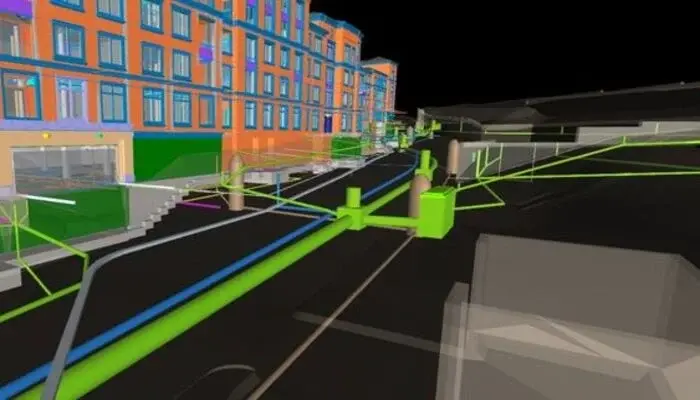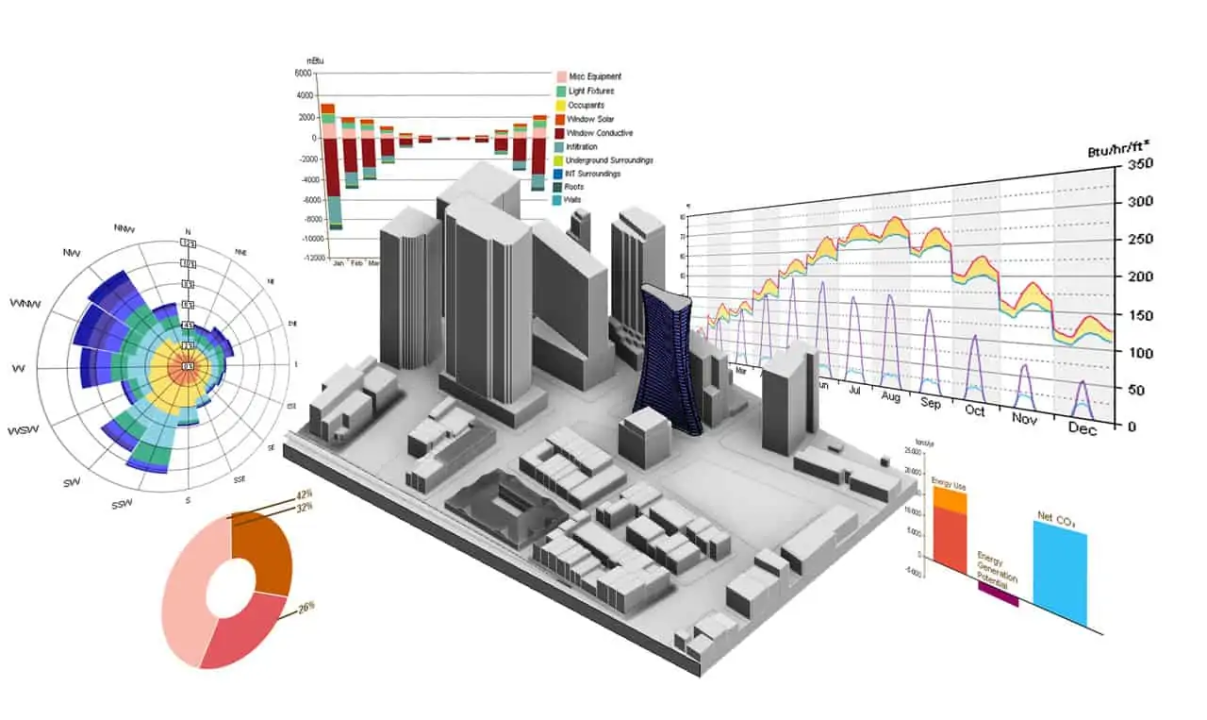
The Architecture, Engineering & Construction (AEC) industry is rapidly evolving, driven by advancements in technology and the growing need for sustainable and efficient solutions. Among these advancements, Building Information Modeling (BIM) has emerged as a revolutionary process, reshaping how projects are planned, designed, executed and managed throughout the lifecycle of a project.
For Civil Engineers, BIM expertise has opened doors to a wealth of global opportunities. This blog explores the prospects for Civil Engineers specialising in BIM, including potential salary hikes, career advancement opportunities and information on MNCs seeking such professionals.
Why is BIM Expertise in High Demand?
Building Information Modeling is more than just a 3D model; it’s a collaborative process that can be utilised during planning, design, construction, operation & maintenance and can be integrated into a single digital framework. Governments worldwide (The UK, Sweden, Singapore, Australia, UAE etc.) are mandating BIM for public projects.
Civil Engineers with BIM expertise are highly in demand because they bridge the gap between traditional engineering and modern technology. By leveraging BIM expertise, they ensure projects are efficient, cost-effective, and sustainable.
High Demand Across Sectors

BIM (Building Information Modeling) is one of the most in-demand skills within the AEC industry worldwide, creating opportunities for skilled professionals in many sectors. It is used in almost all projects such as buildings, highways, dams, tunnels, airports and
railways. Not only governments but also private organisations rely heavily on BIM to improve project efficiency and reduce costs.
In the building sector, BIM is used in commercial, residential, and industrial projects. Architects, Engineers and Contractors use BIM to design, plan and manage complex structures, ensuring better collaboration and fewer revisions or errors during construction.
BIM also plays a vital role in utilities and smart city projects. For example, water management systems, power plants and urban development projects rely on BIM to plan and manage resources efficiently.
Countries like the UK, the USA, Sweden, Norway and Finland are leading in BIM adoption. These countries have strict government mandates and policies for BIM use, driving demand for trained professionals. They also offer attractive career opportunities for BIM experts due to their large-scale projects and advanced construction methods.
Countries such as India and Indonesia are also adopting BIM at a fast pace. Central /State governments and private companies in these regions are investing in large infrastructure projects (Bharatmala Pariyojna, Noida International Airport etc.) and smart city (Jaipur, Hyderabad, Ahmedabad etc.) initiatives, making BIM expertise valuable.
All in all, the demand for BIM professionals is growing across sectors, providing excellent global career opportunities for Civil Engineers and other construction industry experts. A strong foundation in BIM can open doors to high-paying jobs in diverse fields worldwide.
Career Growth
The BIM domain offers exceptional career growth opportunities. A typical career path in BIM begins with entry-level roles such as BIM Modeler, which usually requires 2–3 years of experience to develop expertise. Afterwards, professionals can advance to the role of BIM Engineer. In this position, they work not only on modelling but also address the technical feasibility and contractual aspects of projects.

With another 2–3 years of experience, a BIM professional may progress to a Senior BIM Engineer or BIM Coordinator role, depending on the organisation and responsibilities. These roles involve coordinating digital models, leading meetings and managing RFIs (Requests for Information).
Eventually, with further experience, they can move into senior positions such as BIM Manager/Head, responsible for overseeing entire projects or Digital Transformation Lead, focusing on implementing new technologies and managing the overall BIM strategy.
As their expertise grows, professionals can transition into strategic roles. They can become BIM Consultants, advising companies on adopting BIM best practices or Digital Twin Specialists, focusing on creating virtual replicas of real-world assets.
The growing demand for BIM across industries ensures a steady career progression, with plenty of room to specialise in emerging areas like smart cities or digital construction.
Lucrative Salaries
BIM professionals are in high demand and it can be said that their earning potential is impressive. The pay and perks vary depending on the geographical location, experience in the BIM domain and complexity of the project.
USA: In the United States, BIM Modellers typically earn between $50,000 and $70,000 annually, depending on their skills and responsibilities. Senior roles in some cities can command salaries up to $70,000. BIM Engineers, on the other hand, generally earn between $70,000 and $85,000.
For BIM Coordinators, salaries start around $70,000 and can reach up to $90,000 with sufficient experience. BIM Managers have a broader earning range, with an average salary of approximately $85,000, which can go up to $120,000 for experienced professionals managing significant projects.
UK: In the UK, the salary range for BIM Modellers varies significantly, typically starting at
£28,000 and going up to £40,000. Similarly, BIM Engineers can expect to earn between
£30,000 and £40,000 annually.
BIM Coordinators generally have an average salary of around £30,000, while BIM Managers enjoy higher pay, with salaries starting at approximately £50,000, reflecting their advanced responsibilities and expertise.
Middle East: In the UAE, BIM professionals benefit from competitive, tax-free salaries, making these roles particularly attractive. BIM Modellers typically earn AED 150,000 to AED 250,000 annually, depending on their expertise and project involvement. BIM Engineers see higher ranges, earning between AED 200,000 and AED 300,000, reflecting their advanced technical roles.
BIM Coordinators in the UAE can expect salaries starting from AED 250,000 which can scale up to AED 350,000 with experience. Meanwhile, BIM Managers command the highest pay in the field, with annual earnings ranging from AED 380,000 to AED 500,000, driven by their leadership responsibilities and strategic contribution to major projects. These figures underscore the lucrative opportunities for skilled BIM professionals in the region.
India: In India, BIM salaries are steadily increasing as the demand for skilled professionals grows alongside the construction industry's adoption of BIM technology. Entry-level BIM Modellers and Engineers typically earn between ₹3–6 lakhs per annum, depending on their skills and complexity of the projects they work on.
BIM Coordinators in India often see annual salaries ranging from ₹6–12 lakhs, reflecting their intermediate role and responsibilities in project coordination. Senior BIM professionals, including BIM Managers, command significantly higher pay, with salaries typically ranging between ₹15–20 lakhs per annum. These figures underscore the growing recognition of BIM expertise as an essential part of India's construction industry, with senior roles reflecting the increasing focus on advanced digital tools and project efficiency.
Globally, BIM professionals with the right skills and experience can command competitive salaries. As the adoption of BIM continues to grow, the earning potential for these experts is expected to increase further. This makes BIM an excellent career choice for Civil Engineers and Construction Industry professionals.
Job Roles for BIM Professionals Across Sectors
1. Consulting Firms
-
BIM Consultant
Firms like Deloitte, PwC, and Arup offer services in BIM Consulting, particularly in implementation and process optimisation.
-
Digital Transformation Specialist:
Companies such as WSP and Jacobs are integrating BIM with cutting-edge technologies like AI and IoT. These roles involve leveraging digital tools to enhance construction workflows and ensure seamless integration of advanced technologies within BIM processes.
-
Sustainability Advisor
Organisations like Afry and AECOM are at the forefront of combining BIM with sustainability efforts.
2. Real Estate Developers
-
BIM Manager
Companies like Oberoi Realty, Adani Ltd., and Godrej Properties actively use BIM processes for their large-scale projects.
-
Facilities Management Manager
Global Real Estate firms such as JLL and CBRE utilise BIM for efficient operations and maintenance. Their use of digital models helps streamline building lifecycle management, aligning with the growing adoption of smart technologies for asset management.
3. Contractors
-
BIM Coordinator
They play a pivotal role in aligning digital models across project teams, ensuring efficient collaboration. Target companies are Skanska, Bechtel etc.
-
4D/5D BIM Specialist
This role focuses on managing project schedules (4D) and costs (5D) using BIM. Target companies are Larsen & Toubro, Vinci etc.
-
Virtual Construction Engineer
This role implements BIM directly onsite, bridging the gap between digital models with actual construction activities. Target companies are Balfour Beatty, Bouygues etc.
4. Design and Engineering Firms
-
BIM Modellers
They are responsible for creating detailed 3D models that serve as the foundation for digital project workflows. Target companies are Neilsoft, Pinnacle Infotech etc.
-
Structural BIM Engineers
Their focus is on designing and analysing structural elements using BIM tools, ensuring accuracy and feasibility. Target companies are TCE, Atkins etc.
-
MEP BIM Engineers
This role involves designing and coordinating Mechanical, Electrical, and Plumbing (MEP) systems using BIM. Target companies are WSP, Ramboll etc.

5. Remote Work and Freelancing in BIM
BIM has also opened new doors for such professionals to work remotely. Many companies now prefer hiring freelancers or remote BIM experts for tasks like Modelling, Clash Detection and Coordination. By doing so, firms can reduce their cost and access skilled professionals worldwide.
Freelance platforms such as Fiverr, Upwork, Freelancer, and LinkedIn connect BIM experts with international clients. Freelancers can work on diverse projects, from small-scale designs to large infrastructure assignments, without being tied to a specific location.
Freelance BIM professionals earn competitive rates. Depending on their expertise and the complexity of the project, they can charge between $30 to $100 per hour. For example, a beginner might earn around $30 to $50 per hour, while an experienced BIM Manager can command rates closer to $80 to $100 per hour.
Conclusion
The demand for Civil Engineers with BIM expertise is at its apex as industries are continuously adopting digital transformation. BIM professionals are in high demand across sectors like construction, real estate, and infrastructure. They enjoy competitive salaries and exciting opportunities to work on landmark projects globally.
With BIM expected to drive a market size of $16 Billion by 2027, this is the right time to build a career in BIM. By learning new tools, understanding standards and following global trends like Digital Twins and AI in Construction, professionals can stay ahead.
The future of BIM is bright, offering diverse career paths and the chance to lead innovation in the AEC Industry. Are you ready to begin your BIM journey? The opportunities are endless and the world is waiting for skilled BIM experts like you!
Was this content helpful to you









